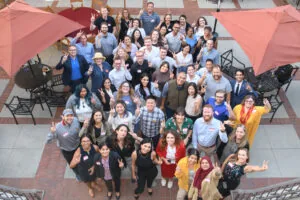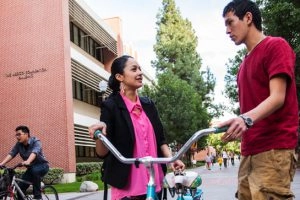Description
In this seminar, USC professors, along with organizational leaders and policy makers, discuss the opportunity for offshore wind farms in California and the status of the initiatives undertaken to reduce the reliance on fossil fuels.
The panel reviews an economic assessment report from the USC Schwarzenegger Institute for State and Global Policy, “California’s Offshore Wind Electricity Opportunity,” which comes in the wake of several key policy developments that will accelerate offshore wind development in the state — including a landmark agreement between the Biden administration and California to open up state coastal waters to offshore wind development for the first time.
Featuring Arnold Schwarzenegger, former governor of California; David Hochschild, chair of the California Energy Commission; Adam Rose, research professor of public policy at the USC Sol Price School of Public Policy; and Dan Wei, research associate professor at USC Price. Moderated by Fran Pavley, environmental policy director of the USC Schwarzenegger Institute.
Who Will Benefit
– Those hoping to learn how California has been successful in integrating new technologies that benefit the climate
– California residents who want to know about the current status of offshore wind development in the state
– Those wanting to learn about the challenges and the opportunities of California’s offshore wind potential
About Our Featured Faculty
Adam Rose is a research professor at USC Sol Price School of Public Policy and director and senior research fellow of USC’s Center for Risk and Economic Analysis of Terrorism Events (CREATE). Previously, he held faculty and department chair positions in applied economics departments at The Pennsylvania State University and West Virginia University, as well as a faculty position at the University of California, Riverside. He received his PhD in economics from Cornell University, but has worked on interdisciplinary topics throughout most of his career.
Professor Rose’s primary research interest is the economics of disasters. He has spearheaded the development of CREATE’s comprehensive economic consequence analysis framework and has done pioneering research on resilience at the level of the individual business/household, market/industry and regional/national economy.
Dan Wei is a research associate professor at the USC Sol Price School of Public Policy. Her research focuses on economic consequence analysis of natural or man-made hazards, modeling of economic impacts of climate mitigation policies and analysis of market-based GHG mitigation policy instruments. Wei’s current projects include development and application of an economic framework to evaluate resilience in recovering from major port disruptions for California Department of Transportation, analysis of economic impacts of the HayWired earthquake scenario for U.S. Geological Survey and evaluation of alternative modeling approaches for the NY Prize Microgrid projects. Wei worked as a postdoctoral research associate in SPPD (now the USC Price School) from 2007 to 2010. She holds a BE degree in engineering physics and an MSc degree in public policy from Tsinghua University and a PhD in geography from The Pennsylvania State University.
Former State Sen. Fran Pavley served 29 years in elected office. Born and raised in Los Angeles, Pavley was elected the first mayor of Agoura Hills in 1982 and served 14 years in the California Assembly and the State Senate. Sen. Pavley authored landmark climate policies (AB 1493, AB 32, SB 32 and others) that have created a market for innovation and investment in clean energy and vehicles, which have helped clean up our air, grow the economy and reduce greenhouse gas emissions. As chair of the Senate’s Natural Resources and Water Committee, she was able to pass California’s Sustainable Groundwater Management Act(SGMA), promote policies to protect our ocean and watersheds, and adopt measures to create more sustainable local water supplies. During her last year in the legislature, Sen. Pavley also authored SB 1425, the Water-Energy Nexus bill. She is working as the Environmental Policy Director for the USC Schwarzenegger Institute and serves on several state and local advisory boards and committees.



